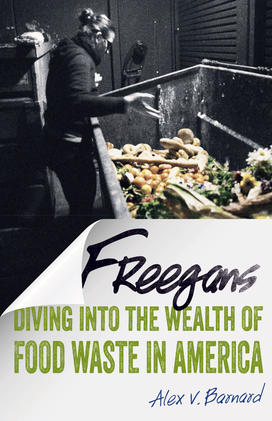The book: If capitalism is such an efficient system, why does 40 percent of all U.S. food production go to waste while one in six people in the nation face hunger? This startling truth has stirred increasing interest and action, but none so radical as that of the freegans, people who object to the overconsumption and environmental degradation on which they claim our economy depends, and opt out of it by living only on what capitalism throws away— including food gleaned from supermarket dumpsters and cast-off clothes and furniture. In Freegans: Diving Into the Wealth of Food Waste in America, Alex V. Barnard ’09 takes a close look at the people who are a part of this movement.

Through years of fieldwork and in-depth interviews with freegans in New York City, Barnard paints a portrait of freegans that leads to questions about ethical consumption and the search for effective forms of action in an era of political disillusionment. Freegans reveals how waste is integrally bound up with our food system, yet at the same time, by showing that markets do not seamlessly translate preferences expressed at the cash register into change in production, Barnard exposes the limits of consumer activism.
The author: Barnard studied sociology as an undergraduate at Princeton and is currently a doctoral candidate in sociology at the University of California, Berkeley, and a food-justice activist.
Opening lines: “On a cold night in December 2008, a slightly overripe tomato sits inside a black plastic trash bag on a sidewalk outside a D’Agostino supermarket in Murray Hill, a wealthy residential district east of midtown Manhattan. A sticker on its side, “Grown in Mexico,” hints at the long trajectory that it took to the curb.”
Reviews: Michael Bell, sociology professor at the University of Wisconsin-Madison says: “Eat this book. If you’re lucky enough tot find it in the trash, dig it out and bite in… Alex V. Barnard writes crisply and invitingly, and his analysis of the ‘fetishism of waste’ is novel and helpful. This is ethnography as it is meant to be.”












No responses yet